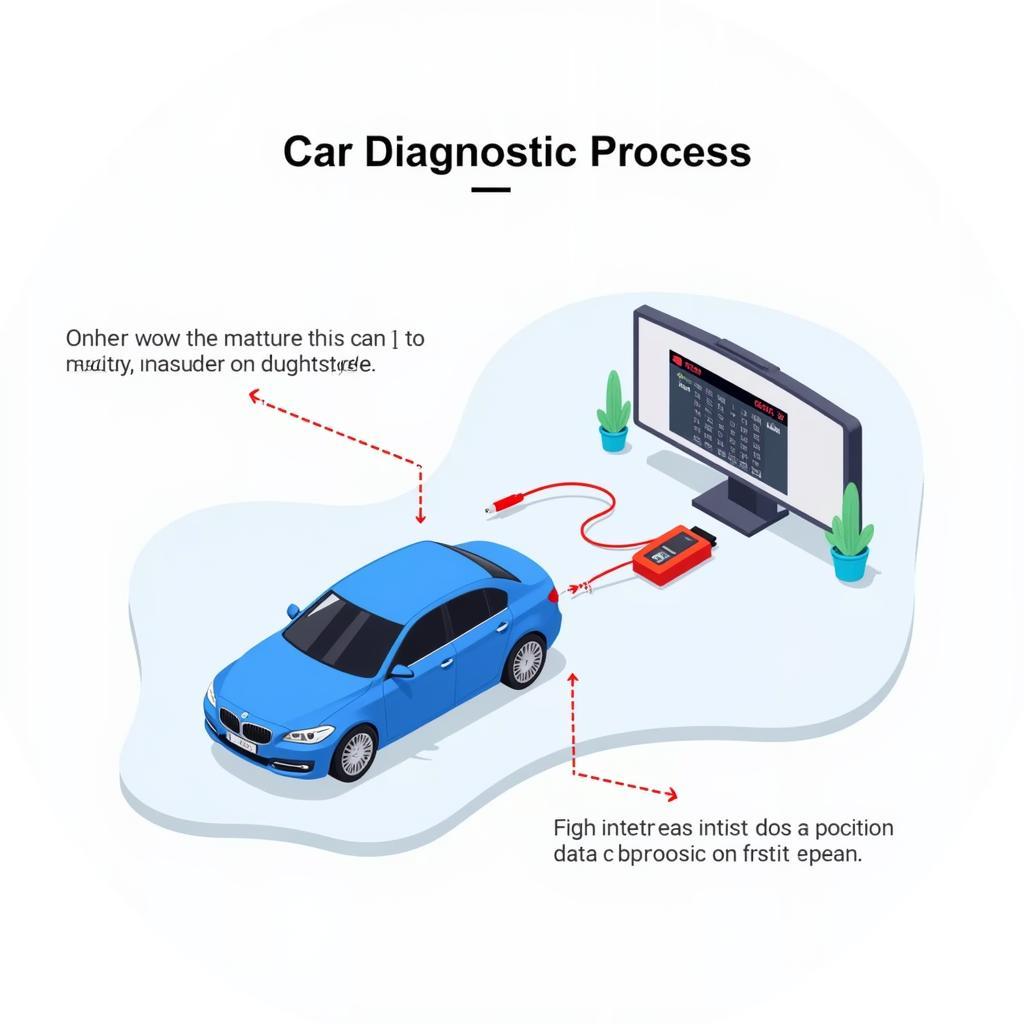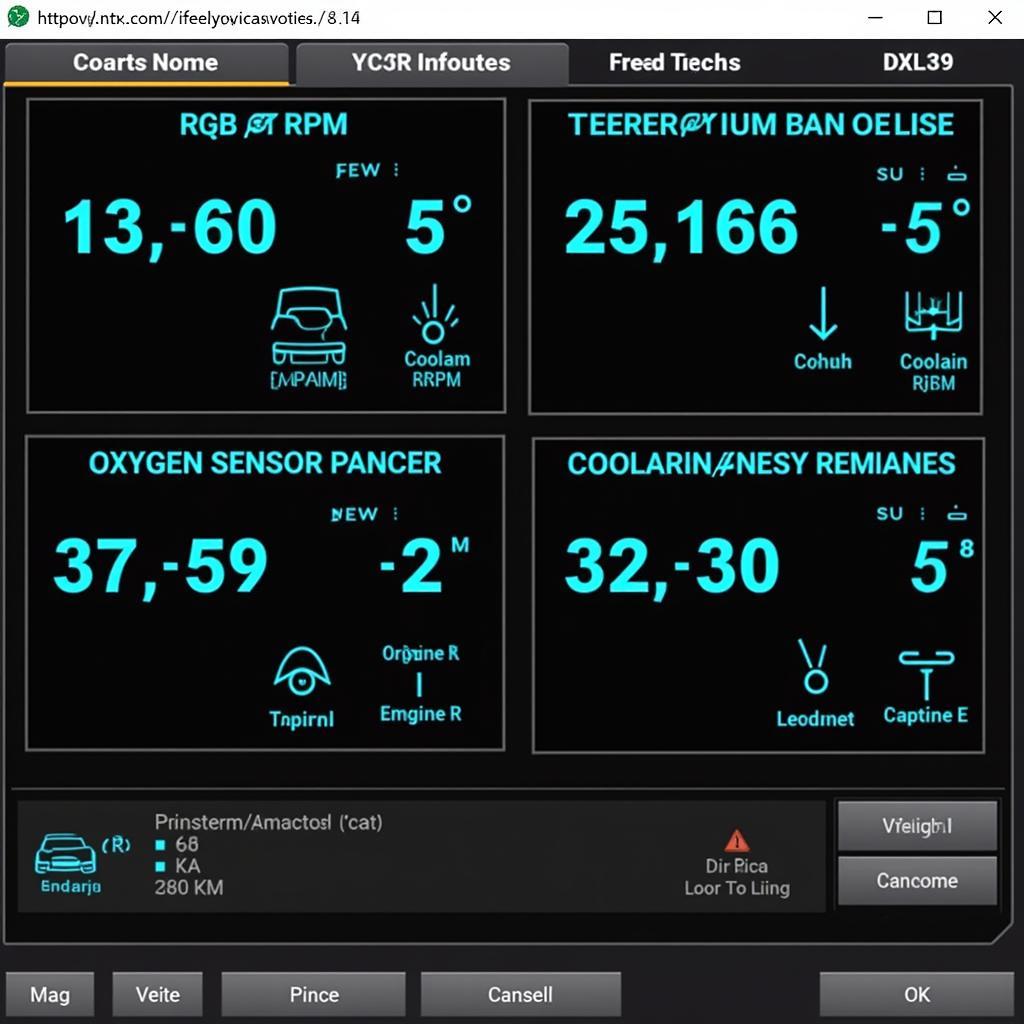Car diagnostic is the process of identifying problems or malfunctions in a vehicle’s various systems. This process utilizes specialized software and hardware, often referred to as diagnostic tools for cars uk, to communicate with the vehicle’s onboard computer and retrieve valuable data. This data, presented in the form of diagnostic trouble codes (DTCs) and other parameters, provides technicians and car owners with insights into the health and performance of the vehicle’s systems.
Delving into Car Diagnostic: How it Works
Imagine your car’s computer system as its brain, constantly monitoring and controlling various functions. When an issue arises, this brain stores a code – a DTC – indicating the problem’s nature and location. Car diagnostic tools act as translators, allowing us to understand these codes and the wealth of data the car’s computer has collected.
 Car Diagnostic Process
Car Diagnostic Process
The Importance of Car Diagnostics in Modern Vehicles
In today’s technologically advanced vehicles, car diagnostics have become indispensable. They offer a plethora of benefits, including:
- Accurate Fault Detection: Gone are the days of relying solely on mechanics’ intuition. Car diagnostics provide precise identification of problems, reducing guesswork and unnecessary repairs.
- Faster Repairs: By pinpointing the root cause of issues, car diagnostics streamline the repair process, saving both time and money.
- Preventive Maintenance: Regular car diagnostics can detect minor issues before they escalate into major problems, prolonging the lifespan of your vehicle.
- Improved Performance: By analyzing performance data, car diagnostics can help optimize engine performance, fuel efficiency, and overall vehicle health.
Exploring Different Types of Car Diagnostic Tools
The market offers a wide array of car diagnostic tools, each catering to different needs and expertise levels:
- Code Readers: These entry-level tools primarily retrieve and display DTCs, providing a basic understanding of the problem.
- OBD-II Scanners: More advanced than code readers, OBD-II scanners offer live data streaming, allowing real-time monitoring of vehicle parameters.
- Professional Diagnostic Scanners: Used by mechanics and dealerships, these sophisticated tools provide comprehensive diagnostic capabilities, including advanced programming and coding functions.
- DIY-Friendly Bluetooth Scanners: Connecting to smartphones or tablets, these portable scanners empower car owners to perform basic diagnostics and monitor vehicle health. For individuals interested in exploring this option, DiagFixPro offers insights into bluetooth car diagnostic checking machine options.
Car Diagnostic: Not Just for Mechanics
While professional-grade diagnostic tools remain crucial for complex repairs, DIY car diagnostic equipment has become increasingly accessible and user-friendly. These tools empower car owners to:
- Understand Warning Lights: Decipher those cryptic dashboard warning lights and gain a better understanding of potential issues.
- Monitor Vehicle Health: Track vital parameters like engine temperature, fuel pressure, and emissions to ensure optimal performance.
- Diagnose Simple Problems: Identify common issues like sensor malfunctions or emissions problems, potentially saving on expensive mechanic visits.
“Empowering car owners with the right knowledge and tools can revolutionize the car maintenance experience,” says John Miller, a seasoned automotive engineer with over 20 years of experience. “DIY diagnostics, coupled with reliable information, fosters a sense of ownership and control over one’s vehicle.”
Choosing the Right Car Diagnostic Tool for You
Selecting the appropriate car diagnostic tool depends on your needs, budget, and technical expertise. Factors to consider include:
- Vehicle Compatibility: Ensure the tool supports your car’s make, model, and year.
- Features and Functionality: Determine the level of detail and functionality required, from basic code reading to advanced programming.
- User Interface: Opt for a tool with a user-friendly interface and clear data presentation.
- Budget: Set a realistic budget and explore options within that range.
Common Car Diagnostic Terms Explained
Navigating the world of car diagnostics can feel overwhelming with its technical jargon. Here’s a breakdown of common terms:
- Diagnostic Trouble Codes (DTCs): Standardized codes that indicate specific malfunctions within the vehicle’s systems.
- OBD-II: On-board diagnostics, generation two, is a standardized system for accessing vehicle diagnostic information.
- CAN Bus: Controller Area Network is a communication protocol used in vehicles to exchange data between different modules.
- Live Data: Real-time information about various vehicle parameters, such as engine speed, coolant temperature, and oxygen sensor readings.
 Car Diagnostic Software Interface
Car Diagnostic Software Interface
The Future of Car Diagnostics
The realm of car diagnostics is continuously evolving, driven by technological advancements and the increasing complexity of vehicles. Emerging trends include:
- Cloud-Based Diagnostics: Wireless connectivity allows for remote diagnostics, data analysis, and software updates.
- Predictive Diagnostics: Utilizing artificial intelligence and machine learning to predict potential problems before they occur.
- Augmented Reality Diagnostics: Overlaying diagnostic information onto the real-world view through smartphones or smart glasses.
Conclusion
Car diagnostic has become an integral aspect of vehicle maintenance and repair. By understanding the basics of car diagnostics and selecting the right tools, both mechanics and car owners can unlock a wealth of information, enabling accurate fault detection, faster repairs, and proactive vehicle maintenance.
If you’re ready to delve deeper into the world of car diagnostics, explore our website for comprehensive reviews, guides, and information on various diagnostic tools, including specialized resources like suzuki car diagnostic software download.
FAQs about Car Diagnostics
1. How often should I get a car diagnostic test?
It’s generally recommended to have your car’s diagnostics checked at least once a year or whenever you notice any unusual behavior or warning lights on your dashboard.
2. Can I perform car diagnostics myself?
Yes, with the availability of DIY-friendly diy car diagnostic equipment, car owners can perform basic diagnostics and monitor vehicle health.
3. What are some common car diagnostic trouble codes?
Some common DTCs include P0420 (catalytic converter efficiency below threshold), P0300 (random/multiple cylinder misfire detected), and P0171 (system too lean (bank 1)).
4. Are there any smartphone apps for car diagnostics?
Yes, many smartphone apps work in conjunction with Bluetooth-enabled OBD-II scanners, providing diagnostic information and vehicle monitoring capabilities.
5. What are the leads required for smartphone car diagnostic tool?
Smartphone car diagnostic tools generally require a Bluetooth connection to the OBD-II port, which is usually located under the dashboard on the driver’s side.
6. What should I do if my car is displaying a diagnostic trouble code?
If your car shows a DTC, it’s crucial to consult a qualified mechanic or use a reliable online resource like DiagFixPro to understand the code’s meaning and potential solutions.
7. Can car diagnostics detect problems with the transmission?
Yes, car diagnostics can detect issues related to the transmission control module (TCM), such as sensor failures, solenoid problems, and gear ratio errors.
Need help with car diagnostics? Contact us via WhatsApp: +1(641)206-8880 or email us at [email protected]. Our 24/7 customer support team is always ready to assist you. For more information and resources, browse through our other informative articles on car diagnostics and repair.

Leave a Reply